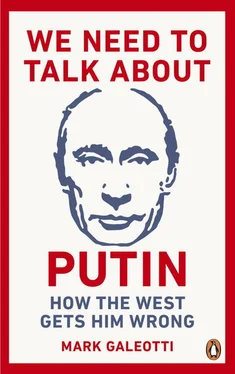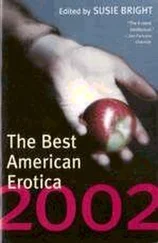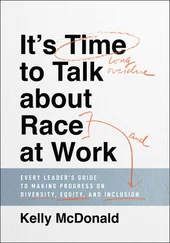Quite what Putin’s goals are I will explore more in Chapter 3. For the moment, it is enough to say that he wants power and stability at home, and recognition abroad. To this end, he needs the country to be quiet, any opposition to be silenced or muzzled, but also for the Russian economy to work, at least after a fashion. That means business with the West, which provides irreplaceable markets for its oil and gas, as well as the investment and technology its modernisation will require. But we are also the main obstacle preventing him from achieving his geopolitical goals, refusing to give Russia the status he demands, and interfering when he tries to assert dominance over neighbours such as Georgia and Ukraine. He realises that the West, when united, is more powerful than Russia on almost any terms, but at the same time believes that our weakness is that we are a constellation of often-fractious democracies. He wants us to be divided, demoralised and distracted to the point where either we are willing to do a deal with him or, more likely, not in a fit state to challenge him.
But Putin doesn’t have any master plan of how to get there. Instead he has, whether by chance or design, stumbled on a way to capitalise on the ambitions and imaginations of all kinds of individuals, institutions and organisations, from journalists and diplomats to spies and businesspeople. On the face of it, Russia looks like any other country. It has all the familiar institutions: a cabinet and ministries, a two-chamber parliament, a constitution, courts and consulates. In practice, things are very different. Putin’s predecessor and patron Boris Yeltsin shelled his own parliament to resolve a constitutional crisis and impose hyper-presidential rule; Putin has gone even further, creating a system that, at least at the top, functions in a similar way to a royal court.
Agencies overlap and compete, formal chains of command are less important than personal relationships, favourites rise and fall, and status and power are defined more by service to the needs of the Kremlin than by any formal institutional or social identity. In this ‘adhocracy’, your job title or even whether you are officially an employee of the state doesn’t necessarily matter. After all, ever since the billionaire Mikhail Khodorkovsky was almost overnight reduced from the richest man in Russia to a convict (see Chapter 8), even the so-called oligarchs, the richest men in Russia, know that their wealth is subject to the power of the state. Instead, the adhocrats are defined by their loyalty, their relationship with the boss and what they can do for him.
Foreign Minister Sergei Lavrov, for example, was a legend in diplomatic circles, but has largely been sidelined since 2014, and was not even invited to attend the meeting at which the decision to annex Crimea was made. He still sits in his office in the foreign ministry, but even his loyal underlings recognise that he is no longer in Putin’s unofficial ‘kitchen cabinet’ and can only put the best spin on policies originated by others. Showing admirable skills in double-talk, one diplomat put it to me that Lavrov had ‘adopted an essentially reactive model, dealing with such situations as arise in a complex and often unpredictable context’. I interpret that as an admission that Lavrov is no longer riding the elephant in the parade, let alone helping to direct it, but is rather following behind it, shovel in hand, cleaning up the mess it leaves.
On the other hand, consider the case of Vladislav Surkov, who was once the choreographer of Russia’s pantomime politics and is now, in effect, Putin’s proconsul in south-eastern Ukraine. In the 2000s, he essentially set up the current Russian political system, with the avowedly pro-Putin United Russia and the two notional opposition parties, the Communists and the Liberal Democrats (who are actually illiberal ultranationalists), which stage protests and grumble in the media but back the government in important votes. The idea was to create a theatrical-but-fake democracy that would keep the people satisfied, without in any way challenging the Kremlin’s grip on power. In 2008, Prime Minister Dmitry Medvedev succeeded Putin as president, as the constitution barred him from standing for a third consecutive four-year term. Putin became Medvedev’s prime minister, although it was clear that this was largely a formality, and he was still in charge. When Putin’s predictable return to the presidency was met with mass protests, precisely the kind of thing Surkov’s ‘managed democracy’ was supposed to prevent, his star fell. However, in 2014, after Moscow encouraged a proxy civil war in the Donbas region of south-eastern Ukraine, in order to prevent the country from aligning itself with the West, Surkov appears to have been made Putin’s man there, even though it is officially run by the unrecognised Donetsk and Lugansk People’s Republics. The point is that Surkov has, at various times, been the architect of Russia’s constitutional politics and virtual governor of an occupied region, but this was never reflected in his official job title. Until 2011, he was Putin’s deputy chief of staff, then Deputy Prime Minister for Economic Modernisation until 2013, and since then simply a presidential aide. Yet in many ways, because of the trust Putin places in him, Surkov has more muscle in determining foreign policy than the foreign minister himself.
A dependence on personal relationships and unspoken understandings – ponyatiye in Russian and, interestingly enough, a term also much used in the criminal underworld – has become central to Putin’s style of rule. He (and increasingly often his senior people, too) rarely gives direct instructions, but defines broad objectives and hints as to what he might like to happen. As journalist Mikhail Zygar has put it, ‘They would never say, “Please steal those billions of dollars” or “Please murder those journalists.” They [instead] say, “Do what you have to do. You know your obligations; please fulfil them.”’ So the adhocrats become policy entrepreneurs, seeking and seizing opportunities to develop and implement ideas they think will please the boss, based on hints and guesses. If you get it right you are rewarded, but if you fail the Kremlin can disown you. In many ways, the vital skill in Putin’s Russia has become predicting today what the boss will want tomorrow.
Putin the judoka-tsar lords it over an army of smaller judokas, all of whom are looking for a chance to get on. Consider, for example, RT, the infamous foreign-language television network. A strange mix of good journalism, opinionated commentary and toxic propaganda, it is one of the tools Moscow uses to get its message out in the world or, more often, simply to undermine others’. Speaking to people who work there, it is clear that, while the Kremlin sometimes steps in and dictates the official line – typically in the wake of some major embarrassment, such as when Ukrainian rebels shot down a Malaysian Airlines passenger jet with a Russian-supplied missile in 2014 – more often it is a much less direct process. Every Friday, Dmitry Peskov, Putin’s inflexible-but-affable press spokesman, sits down with the editors of the main government media platforms to lay out the lines and talking points he would like to see covered in the week ahead. He doesn’t dictate copy or set headlines – he expects them to use their initiative, and they expect the same of their people. When a major event occurs, producers and presenters at RT may well have different ideas how best to frame it, to meet what they think what their bosses – and their bosses’ boss – want. These different ideas may then be played out in various programmes, with everyone hoping that theirs gets noticed and approved. Effort, imagination, enthusiasm and ambition are all harnessed, without the tedious need to micromanage everything from the top.
Читать дальше












